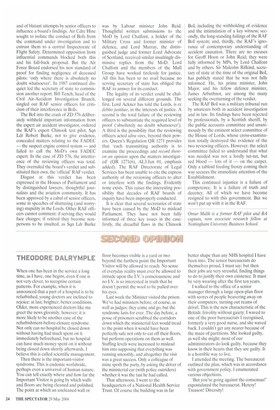THEODORE DALRYMPLE
When one has been in the service a long time, as I have, one begins, even if one is not very clever, to recognise certain patterns. For example, when it is announced that a part of a hospital is to be refurbished, young doctors are inclined to rejoice: at last, brighter, better conditions. Older, more experienced doctors like me greet the news gloomily, however; it is more likely to be another case of the refurbishment-before-closure syndrome. Not only can no hospital be closed down without having had much spent on it immediately beforehand, but no hospital can have much money spent on it without being closed down shortly afterwards. I believe this is called scientific management.
Then there is the important-visitor syndrome. This is endemic worldwide, perhaps even a universal of human nature. You can tell exactly where and how far the Important Visitor is going by which walls and floors are being cleaned and polished. The point at which an uncleaned wall or floor becomes visible is a yard or two beyond the furthest point the Important Visitor will be allowed to reach. No sense of everyday reality must ever be allowed to intrude upon the consciousness; and no I.V. is so interested in truth that he doesn't permit the wool to be pulled over his eyes.
Last week the Minister visited the prison. We've had ministers before, of course, as well as judges: they come and go, but the syndrome lasts for ever. The day before, a posse of prisoners scrubbed the corridors down which the ministerial feet would tread to the point when it would have been perfectly safe not only to eat off their floors, but perform operations on them as well. Staffing levels were increased to mislead him into supposing that everything was running smoothly, and altogether the visit was a great success. Only a colleague of mine spoilt the party, by asking the driver of the ministerial car (with police outriders) whether it was the taxi he had called.
That afternoon. I went to the headquarters of a National Health Service Trust. Of course the building was in far better shape than any NHS hospital I have been into. The senior bureaucrats do themselves proud, I must say: but then their jobs are very stressful, finding things to do to justify their own existence. It must be very wearing after the first ten years.
I walked to the office of a senior manager through a large open-plan floor with scores of people beavering away on their computers, turning out reams of drivel. This is the new characteristic of the British: frivolity without gaiety. I waved to one of the poor bureaucrats I recognised, formerly a very good nurse, and she waved back. I couldn't get any nearer because of the maze of partitions. She looked guilty, as well she might; most of our administrators do look guilty, because they know in their hearts that they are guilty. It is a horrible way to live.
I attended the meeting. The bureaucrat outlined the plan, which was in accordance with government policy. I enumerated various objections.
'But you're going against the consensus!' expostulated the bureaucrat. Heresy! Treason! Diversity!


































































 Previous page
Previous page